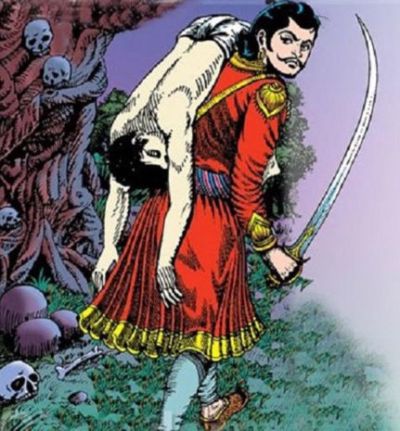“To think that you would take up this task at such a desolate place, in the dead of the night!”
“It is indeed true, that you are the king of kings, a man of unparalleled courage. You put the interests of others before your own interests. This is indeed the sign of great men – they do not hesitate from completing their intended tasks, even at the cost of their own lives.”

इति ब्रुवन् स सिद्धार्थमानी भिक्षुर् महीपतेः ।
तस्यावतारयामास स्कन्धात् तं मटकं तदा ॥ १२,३२.९ ॥
स्नपयित्वा समालभ्य बद्धमाल्यं विधाय च ।
मटकं मण्डलस्यान्तः स्थापयामास तस्य तत् ॥ १२,३२.१० ॥
भस्मोद्धूलितगात्रश् च केशयज्ञोपवीतभृत् ।
प्रावृतप्रेतवसनो भूत्वा ध्यानस्थितः क्षणम् ॥ १२,३२.११ ॥
तस्मिन् मन्त्रबलाहूतं प्रवेश्य नृकलेवरे ।
तं वेतालवरं भिक्षुः पूजयामास स क्रमात् ॥ १२,३२.१२ ॥
ददौ तस्मै कपालार्घपात्रेणार्घ्यं सुनिर्मलैः ।
नरदन्तैस् ततः पुष्पं सुगान्धि च विलेपनम् ॥ १२,३२.१३ ॥
दत्त्वा मानुषनेत्रैश् च धूपं मांसैर् बलिं तथा ।
समाप्य पूजां राजानं तम् उवाच स पार्श्वगम् ॥ १२,३२.१४ ॥
राजन्न् इहास्य मन्त्राधिराजस्य कृतसंविधेः ।
प्रणामम् अङ्गैर् अष्टाभिर् निपत्य कुरु भूतले ॥ १२,३२.१५ ॥
With these words, a delighted ShāntiShila took down the corpse from the king’s shoulders. He then bathed it, garlanded it, and placed it within the circle. He smeared it’s limbs with ashes, put on a sacrificial thread of hair, and then clothed himself in the garments of that corpse.
He then began to meditate, and before long, he summoned the Vetāla by the powers of his mantras, and made it enter the corpse.
He then started an elaborate ritual of worship, that included an Arghya from a bowl made from a skull, flowers, a paste of dried blood, smoke and flesh.
Once done, he addressed the king, and said to him…
“King, it is time for you to pay your respects. Perform an astānga namaskara, with your eight limbs touching the ground, so that the Vetāla that has manifested in this corpse can give you any boon that you desire!”
येनाभिप्रेतसिद्धिं ते दास्यत्य् एष वरप्रदः ।
श्रुत्वैतत् स्मृतवेतालवचा राजाब्रवीत् स तम् ॥ १२,३२.१६ ॥
नाहं जानामि तत् पूर्वं प्रदर्शयतु मे भवान् ।
ततस् तथैव तद् अहं करिष्ये भगवन्न् इति ॥ १२,३२.१७ ॥
ततो दर्शयितुं यावत् स भिक्षुः पतितो भुवि ।
तावत् खड्गप्रहारेण स राजास्य शिरो ऽच्छिनत् ॥ १२,३२.१८ ॥
आचकर्ष च हृत्पद्मम् उदराद् अस्य पाटितम् ।
वेतालाय च तस्मै तच्छिरोहृत्कमलं ददौ ॥ १२,३२.१९ ॥
साधुवादे ततो दत्ते प्रीतैर् भूतगणैस् ततः ।
तुष्टो ऽब्रवीत् स वेतालो नृपं तं नृकलेवरात् ॥ १२,३२.२० ॥
राजन् विद्याधरेन्द्रत्वं भिक्षोर् आसीद् यद् ईप्सितम् ।
तत् तावद् भूमिसाम्राज्यभोगान्ते ते भविष्यति ॥ १२,३२.२१ ॥
क्लेशितो ऽसि मया यत् त्वं तद् अभीष्टं वरं वृणु ।
इत्य् उक्तवन्तं वेतालं स राजा तम् अभाषत ॥ १२,३२.२२ ॥
The king heard him, and thought of what the Vetāla had said to him, and replied…
“Revered sage, I do not know how to do an astānga namaskara in the manner that you prescribe. If you would be kind enough to demonstrate it for me, so that I can observe you and do exactly as you say…”
ShāntiShila agreed and lay prostrate on the ground, on his stomach, demonstrating the astānga namaskara. King Vikram immediately drew his sword, and sliced of ShāntiShila’s head with a swift stroke. He then tore out his heart, and offered it to the Vetāla.
Right then, the air rang with the praises of the spirits, and the Vetāla addressed him from inside the corpse…
“Oh mighty king! The sovereignty of the Vidyādharas,which was desired by the evil ShāntiShila, is now yours, once your life on this earth has come to an end. I have annoyed you a lot, but you kept your patience. I am pleased – ask me for any boon that you desire!”
King Vikram replied…
to be continued…
